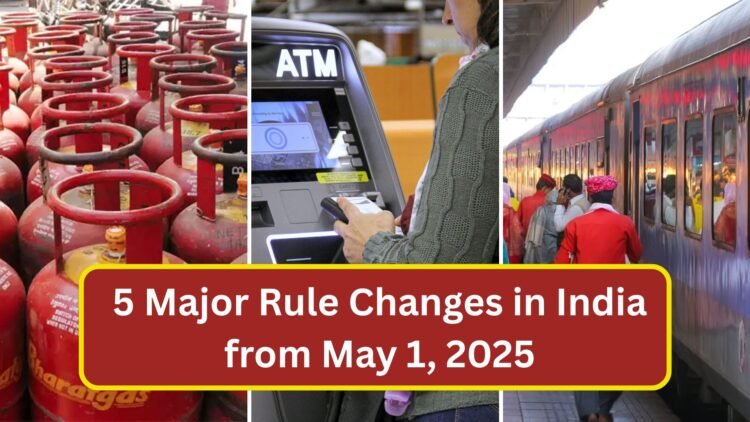As the calendar flips to May 1, 2025, India is gearing up for a series of significant regulatory changes that will touch every household and wallet. From the cost of cooking gas to the way you withdraw cash or book train tickets, these updates are set to reshape daily routines. Whether you’re a frequent traveler, a budget-conscious homemaker, or someone who relies on banking services, these changes demand your attention. Here’s a detailed breakdown of the five major rule changes starting May 1, 2025, and what they mean for you.
1. LPG Cylinder Prices: A Monthly Revision with Big Implications
Every month, oil marketing companies like Indian Oil, Hindustan Petroleum, and Bharat Petroleum review LPG cylinder prices, and May 1, 2025, is no exception. The cost of both domestic (14.2 kg) and commercial (19 kg) cylinders may see adjustments based on global fuel prices and exchange rates. In April 2025, domestic cylinder prices surged by Rs 50, pushing rates to approximately Rs 853 in Delhi and Rs 879 in Kolkata. While a price cut is possible, experts predict stability or a slight increase due to fluctuating crude oil markets.

For households, especially those under the PM Ujjwala Yojana, subsidies will continue to cushion the blow, directly credited to bank accounts. However, any price hike could strain monthly budgets, particularly for low-income families.
Tip: Check updated rates on the first of the month and consider booking cylinders early to avoid last-minute price shocks.
2. ATF, CNG, and PNG Prices: Ripple Effects on Travel and Cooking
Alongside LPG, May 1 will bring revisions to Aviation Turbine Fuel (ATF), Compressed Natural Gas (CNG), and Piped Natural Gas (PNG) prices. ATF price changes directly impact airfares, potentially making domestic and international flights costlier if fuel costs rise. In 2024, ATF prices fluctuated significantly, with a 2% hike in March, and similar trends are expected in 2025.
CNG and PNG price revisions will affect vehicle owners and households relying on piped gas for cooking. Cities like Mumbai and Delhi, where CNG is a popular fuel for public transport, could see commuting costs rise if prices increase. Households using PNG may also need to adjust budgets. Tip: Monitor fuel price announcements and explore carpooling or public transport to offset rising CNG costs.

3. ATM Transaction Fees: Cash Withdrawals Get Pricier
Starting May 1, 2025, withdrawing cash from ATMs will become more expensive, thanks to a fee hike approved by the Reserve Bank of India (RBI) and the National Payments Corporation of India (NPCI). If you use another bank’s ATM, the transaction fee will rise from Rs 17 to Rs 19 per withdrawal, and balance inquiries will cost Rs 7 instead of Rs 6. Major banks like HDFC, PNB, and IndusInd have also announced increases, with non-free transactions now costing Rs 23 plus taxes, up from Rs 21.

Most banks offer 3–5 free transactions monthly at non-home ATMs, depending on whether you’re in a metro or non-metro city. Exceeding this limit will hit your wallet harder. This change aims to cover rising ATM operational costs but may push users toward digital payments like UPI.
Tip: Stick to your bank’s ATMs or reduce cash usage by embracing digital wallets for small transactions.
4. Railway Ticket Booking: Stricter Rules for Travelers
Indian Railways is introducing significant changes to ticket booking rules effective May 1, 2025, aimed at streamlining travel and reducing overcrowding. The advance reservation period has been slashed from 120 days to 60 days, meaning you’ll need to plan trips closer to the travel date. This change is expected to reduce cancellations, as shorter booking windows align better with confirmed plans.

Additionally, waiting-list tickets will now be valid only for general coaches. Passengers with waiting tickets can no longer board sleeper or AC coaches, a move to ensure confirmed ticket holders get their seats. Railway fares and cancellation charges may also see a hike, making travel costlier.
Tip: Book tickets early via IRCTC’s website or app, and double-check your travel plans to avoid cancellation fees.
5. One State-One RRB Scheme: A Banking Overhaul in 11 States
The ‘One State-One RRB’ initiative, launching May 1, 2025, will merge Regional Rural Banks (RRBs) in 11 states, reducing the total number of RRBs from 43 to 28. States like Uttar Pradesh, Andhra Pradesh, Bihar, Gujarat, and Rajasthan will see multiple RRBs consolidated into a single, stronger entity per state. This reform, driven by the Ministry of Finance, aims to enhance banking efficiency, lower operational costs, and improve digital services for rural customers.
For customers, this means better access to modern banking facilities, such as mobile apps and expanded branch networks. However, some rural areas may face temporary disruptions during the transition.
Tip: Stay updated on your bank’s merger status and verify account details to ensure a smooth switch.
Why These Changes Matter
These rule changes, effective May 1, 2025, are more than just policy updates—they directly influence your monthly expenses, travel plans, and banking habits. Rising LPG and fuel prices could strain household budgets, while higher ATM fees may nudge you toward cashless transactions. Stricter railway rules demand smarter travel planning, and the RRB merger promises long-term banking benefits but requires short-term vigilance.
By staying informed and adapting to these shifts, you can minimize financial surprises. Check official sources like oil company websites, RBI notifications, IRCTC updates, and your bank’s communications to stay ahead. As India navigates these changes, proactive planning will keep your daily life on track.
(India CSR)





















